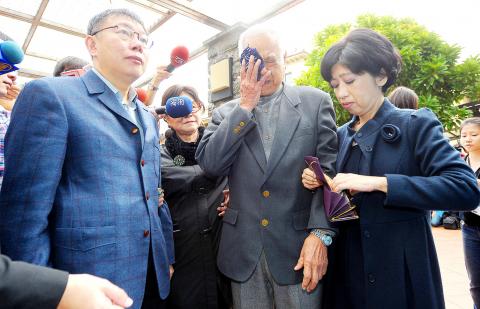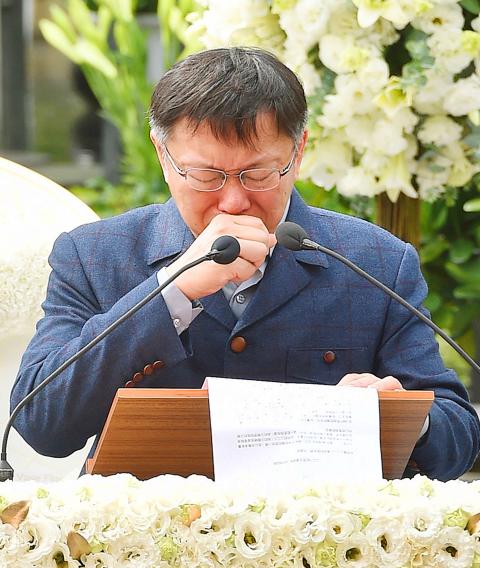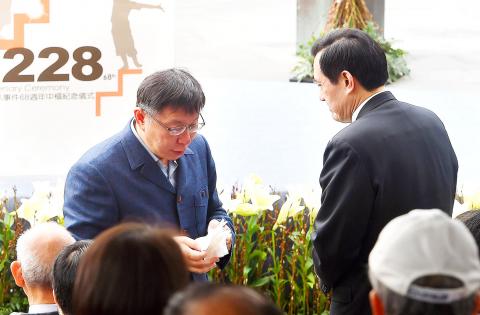The painful history of the 228 Incident — and the torment and grief that families of its victims still feel — were brought into sharp focus yesterday by Taipei Mayor Ko Wen-je (柯文哲) when he delivered an emotional speech at the government’s memorial ceremony, after which it appeared that he refused to shake hands with President Ma Ying-jeou (馬英九).
During his address at the 228 Memorial Park in Taipei yesterday, Ko choked up several times when talking about his grandfather, Ko Shih-yuan (柯世元), who survived the 228 Incident in 1947, but died three years later of the injuries he reportedly suffered after torture and beatings by Chinese Nationalist Party (KMT) troops.
Ko Wen-je’s father, Ko Cheng-fa (柯承發), also attended the event.

Photo provided by Taipei Photojournalists Association
It was the mayor’s first time addressing a national audience at a 228 memorial since taking office.
Ma, Premier Mao Chih-kuo (毛治國) and other KMT government officials were also in attendance.
Ko is the first Taipei mayor whose family suffered directly in the 228 Massacre, and he was invited to represent victims’ families.

Photo: Liao Chen-hui, Taipei Times
Observers said that his taking the central stage at the memorial was an important occasion, charged with political symbolism and historic meaning for Taiwanese.
“Just how painful was the aftermath of the 228 Incident? It is suffering that went beyond words. My father never wanted to talk about what happened to his father. He did not want our generation to bear the suffering of the older generation,” Ko Wen-je said.
“We must have the truth; then we may forgive. Only then can we have reconciliation and peace,” he added. “We must not allow such a tragedy to happen to our children and our grandchildren. This is the responsibility of our generation. Only when there is justice in government can we have harmony in society — and have a future for our nation.”

Photo: Liao Chen-huei, Taipei Times
“Not knowing much about my grandfather, I learned about him from history and from old photographs. I got to know about my grandfather only by the tears my father shed at each year’s 228 commemoration services,” he said.
“During that sorrowful and grieving time of 1947, many Taiwanese lost their families, relatives and friends,” he said. “Society also lost many intellectuals and its elite. It also left a legacy of fear and terror in Taiwan’s history, which resulted in silence and divisions between people, creating an invisible, cold-hearted wall that still divides society today.”
Ko Wen-je frequently wiped away tears.
After his speech, he twice appeared to decline shaking hands with Ma.
As Ma first offered a handshake, Ko waved his hand in a gesture of refusal after leaving the podium. At the end of the ceremony, Ma shook hands with family members of victims and again offered his hand to Ko, who apparently refused again.
Ko Wen-je’s mother, Ho Jui-ying (何瑞英), dismissed speculation over her son’s behavior when reporters sought comment later in the afternoon about the episode, which triggered a flurry of media reports.
It would have been rude for Ko to shake hands with the president, because her son was holding a soiled tissue, Ho said.
“He could not just throw the tissue on the ground out there. With the tissue in his hand, he was unable to shake President Ma’s hand,” she said.
During yesterday’s event, several groups organized separate protests against Ma and the KMT outside the ceremony venue.
Protest organizers and participants including the Taiwanese National Party, the Organization for Taiwanese National Declaration and the Taijimen group, which led to brief confrontations with police officers deployed to provide security.
Additional reporting by Shih Hsiu-chuan

Intelligence agents have recorded 510,000 instances of “controversial information” being spread online by the Chinese Communist Party (CCP) so far this year, the National Security Bureau (NSB) said in a report yesterday, as it warned of artificial intelligence (AI) being employed to generate destabilizing misinformation. The bureau submitted a written report to the Legislative Yuan in preparation for National Security Bureau Director-General Tsai Ming-yen’s (蔡明彥) appearance before the Foreign Affairs and National Defense Committee today. The CCP has been using cognitive warfare to divide Taiwanese society by commenting on controversial issues such as Taiwan Semiconductor Manufacturing Co’s (TSMC, 台積電) investments in the

HELPING HAND: The steering committee of the National Stabilization Fund is expected to hold a meeting to discuss how and when to utilize the fund to help buffer the sell-off The TAIEX plunged 2,065.87 points, or 9.7 percent, to close at 19,232.35 yesterday, the highest single-day percentage loss on record, as investors braced for US President Donald Trump’s tariffs after an extended holiday weekend. Amid the pessimistic atmosphere, 945 listed companies led by large-cap stocks — including Taiwan Semiconductor Manufacturing Co (TSMC, 台積電), Hon Hai Precision Industry Co (鴻海精密) and Largan Precision Co (大立光) — fell by the daily maximum of 10 percent at the close, Taiwan Stock Exchange data showed. The number of listed companies ending limit-down set a new record, the exchange said. The TAIEX plunged by daily maxiumu in just

INVESTIGATION: The case is the latest instance of a DPP figure being implicated in an espionage network accused of allegedly leaking information to Chinese intelligence Democratic Progressive Party (DPP) member Ho Jen-chieh (何仁傑) was detained and held incommunicado yesterday on suspicion of spying for China during his tenure as assistant to then-minister of foreign affairs Joseph Wu (吳釗燮). The Taipei District Prosecutors’ Office said Ho was implicated during its investigation into alleged spying activities by former Presidential Office consultant Wu Shang-yu (吳尚雨). Prosecutors said there is reason to believe Ho breached the National Security Act (國家安全法) by leaking classified Ministry of Foreign Affairs information to Chinese intelligence. Following interrogation, prosecutors petitioned the Taipei District Court to detain Ho, citing concerns over potential collusion or tampering of evidence. The

‘COMPREHENSIVE PLAN’: Lin Chia-lung said that the government was ready to talk about a variety of issues, including investment in and purchases from the US The National Stabilization Fund (NSF) yesterday announced that it would step in to staunch stock market losses for the ninth time in the nation’s history. An NSF board meeting, originally scheduled for Monday next week, was moved to yesterday after stocks plummeted in the wake of US President Donald Trump’s announcement of 32 percent tariffs on Taiwan on Wednesday last week. Board members voted to support the stock market with the NT$500 billion (US$15.15 billion) fund, with injections of funds to begin as soon as today. The NSF in 2000 injected NT$120 billion to stabilize stocks, the most ever. The lowest amount it